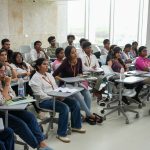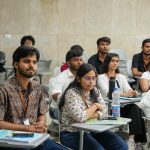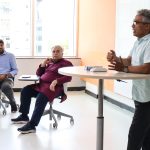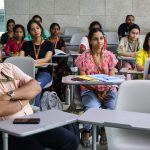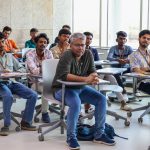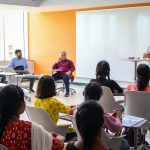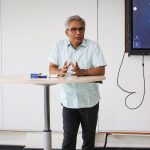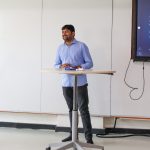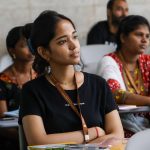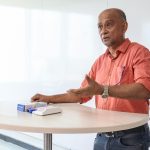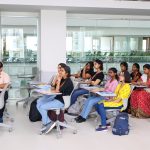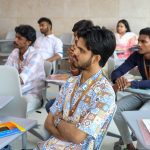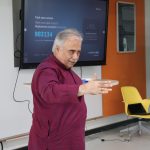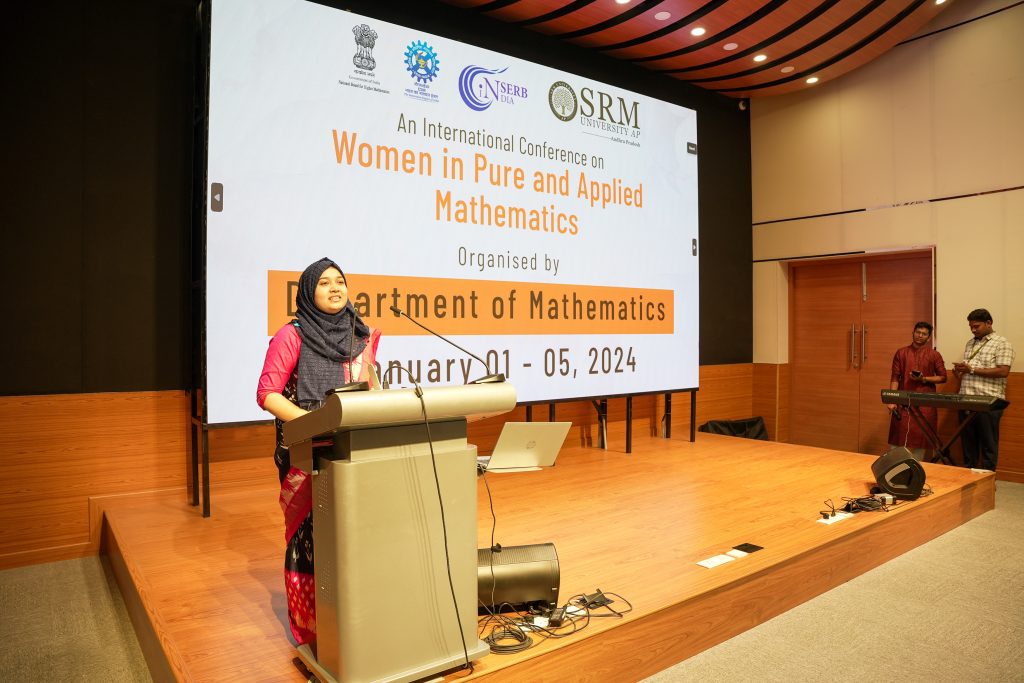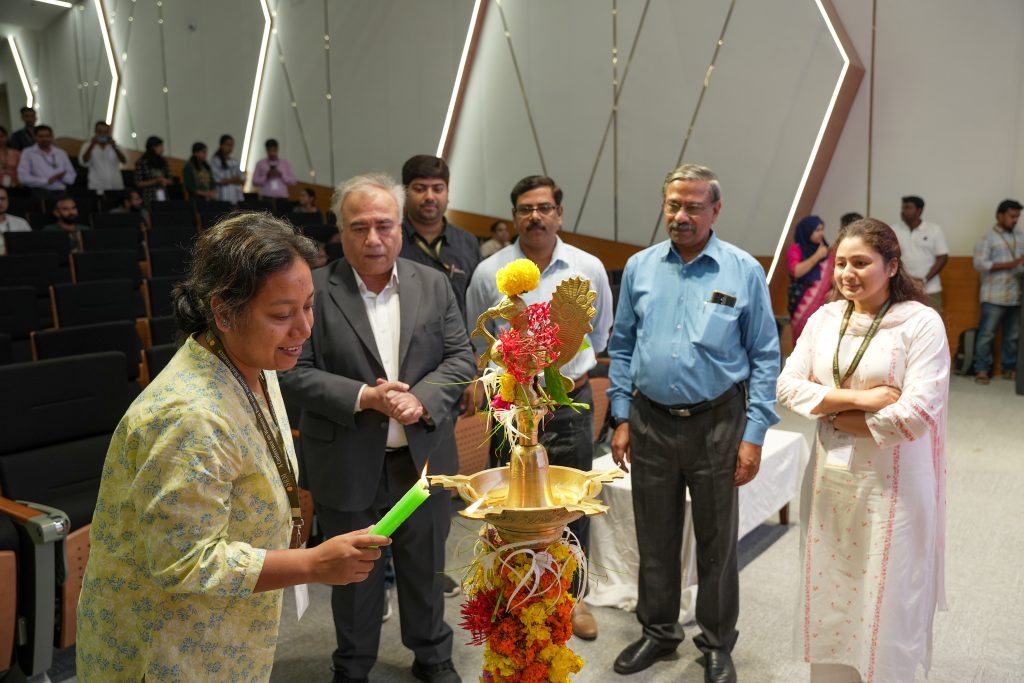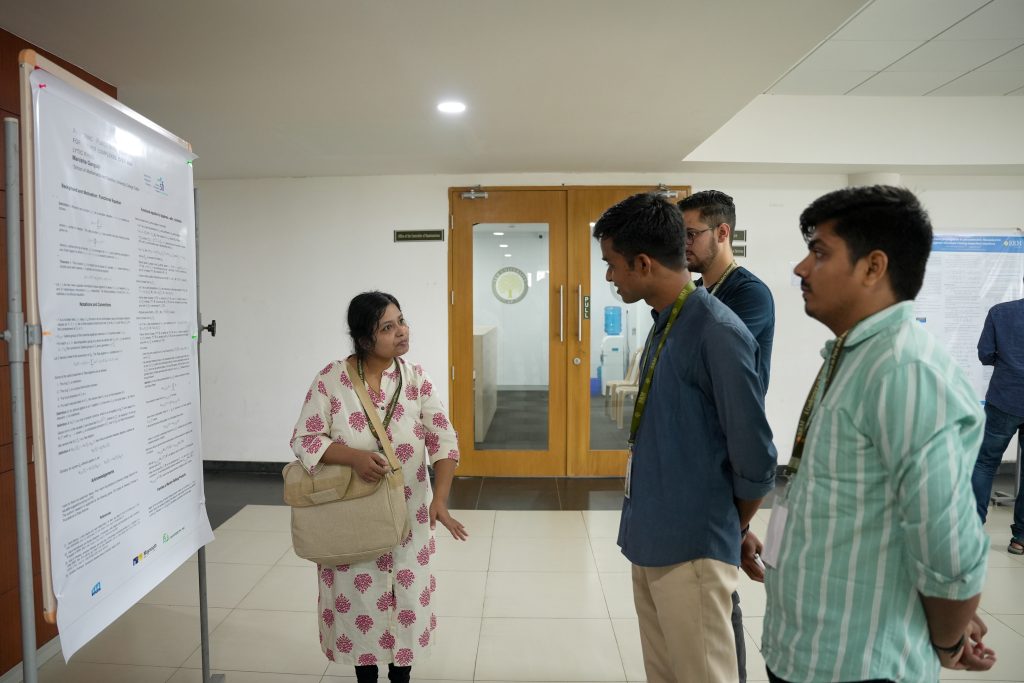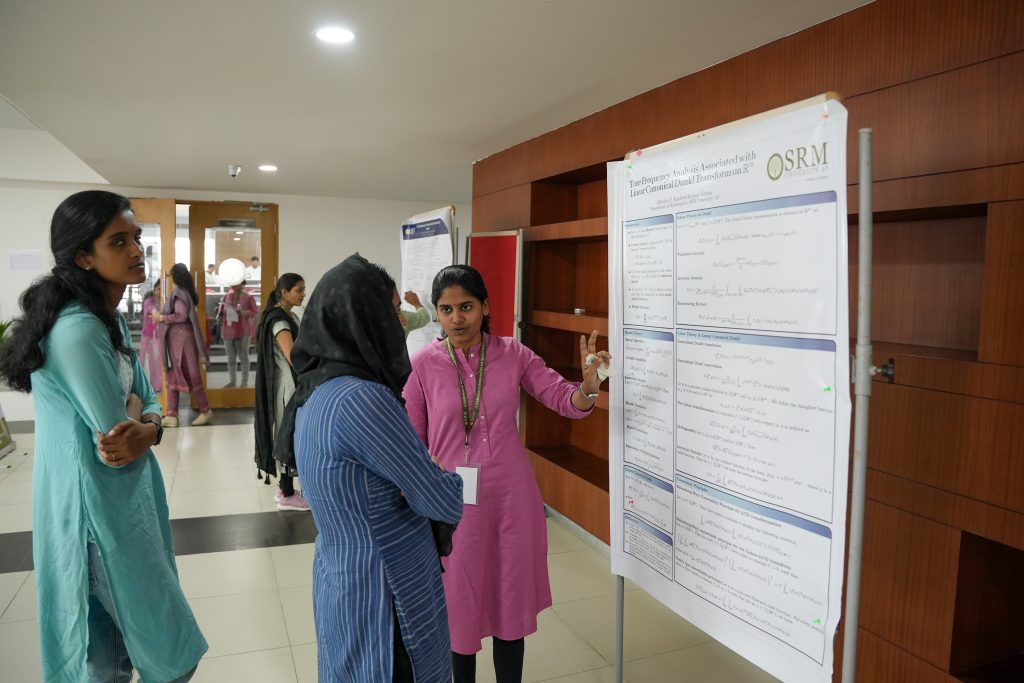Recent News
- Chetna: Awakening Mathematical Minds July 4, 2024
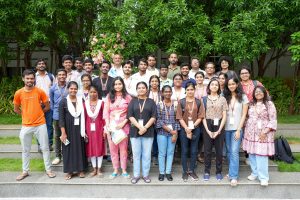 The Department of Mathematics at SRM University-AP successfully conducted a two-week summer programme “Chetna: Awakening Mathematical Minds” from June 17th to June 28th, 2024. This programme aimed to inspire and enhance mathematical understanding among participants from various parts of the country. The programme saw enthusiastic participation from 25 students hailing from different states across India, including West Bengal, Assam, Kerala, Karnataka, Tamil Nadu, Maharashtra, Gujarat, Delhi and Andhra Pradesh.
The Department of Mathematics at SRM University-AP successfully conducted a two-week summer programme “Chetna: Awakening Mathematical Minds” from June 17th to June 28th, 2024. This programme aimed to inspire and enhance mathematical understanding among participants from various parts of the country. The programme saw enthusiastic participation from 25 students hailing from different states across India, including West Bengal, Assam, Kerala, Karnataka, Tamil Nadu, Maharashtra, Gujarat, Delhi and Andhra Pradesh.The programme featured a diverse curriculum, covering a wide range of mathematical topics. Eleven subjects were taught by eleven distinguished faculty members from the Department of Mathematics. The subjects provided a broad and enriching mathematical experience, designed to ignite a passion for mathematics in the participants.
Insights of the Two-Week Programme
First Week Highlights
1. Number Theory by Prof. Kalyan Chakraborty
The first week began with an in-depth exploration of Number Theory. Prof. Kalyan Chakraborty introduced participants to fundamental concepts such as divisibility, prime numbers, and modular arithmetic. The engaging sessions provided a strong foundation in understanding the properties and applications of numbers.2. Abstract Algebra by Dr Anirban Bose
Dr Anirban Bose led the sessions on Abstract Algebra, diving into structures like groups, rings, and fields. The course covered essential algebraic concepts and their applications, enhancing the participants’ problem-solving skills and theoretical knowledge.3. Linear Algebra and Basic Operators by Dr Animesh Bhandari
Dr Animesh’s lectures on Linear Algebra included topics such as vector spaces, linear transformations, and matrices. The sessions aimed to build a solid understanding of linear systems and the role of operators in mathematical computations.4. Graph Theory by Dr Fouzul Atik
Graph Theory, taught by Dr Fouzul Atik, introduced participants to the study of graphs, which are mathematical structures used to model pairwise relations between objects. Topics included graph traversal, connectivity, and graph colouring, providing insights into the practical applications of graph theory.5. Ordinary Differential Equation by Dr Nityananda Roy
The week concluded with Dr Nityananda Roy’s sessions on Ordinary Differential Equations (ODEs). This course covered methods of solving first-order and higher-order ODEs, along with real-world applications of differential equations in various fields.Second Week Highlights
1. Advanced Algebra by Dr Kalyan Banerjee
Building on the first week, this subject delved deeper into algebraic structures, including advanced group theory and ring theory, preparing students for research-level problems.2. Metric Spaces by Dr Choiti Bandyopadhyay
Dr Choiti’s sessions on Metric Spaces introduced participants to the concepts of distance and convergence in metric spaces. Topics included open and closed sets, continuity, and compactness, providing a deeper understanding of analysis.3. Foundations of Probability and Statistics by Dr Vijayakrishna Rowthu
Dr. Vijayakrishna covered the Foundations of Probability and Statistics, focusing on probability theory, random variables, and statistical inference. The course aimed to equip participants with the skills needed to analyze and interpret data.4. Mathematical Modelling by Dr Tapan Kumar Hota
Dr. Tapan’s lectures on Mathematical Modelling demonstrated how mathematics can be used to represent, analyse, and solve real-world problems. The course included case studies and practical applications in various disciplines.5. Partial Differential Equation by Dr Ram Baran Verma
The sessions on Partial Differential Equations (PDEs) by Dr Ram Baran explored methods of solving PDEs and their applications in physics and engineering. Topics included separation of variables, Fourier series, and boundary value problems.6. Math Education by Dr Jayasree Subramanian
The final course on Math Education, taught by Dr Jayasree, focused on pedagogical approaches and techniques for teaching mathematics effectively. The sessions aimed to inspire future educators and enhance their teaching methodologies.Conclusion
Continue reading →
The “Chetna: Awakening Mathematical Minds” summer programme was a resounding success, providing participants with valuable insights and knowledge in mathematics. The diverse backgrounds of the participants and the expertise of the faculty created a vibrant and stimulating learning environment, fostering a deeper appreciation for the subject. The Department of Mathematics at SRM University -AP looks forward to organising similar programmes in the future to continue inspiring young mathematical minds across the country. - Unlocking Cholesterol Homeostasis: A Mathematical Modelling Perspective May 14, 2024
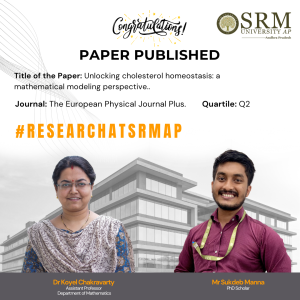 In a significant stride towards understanding cholesterol homeostasis, Dr Koyel Chakravarty, Assistant Professor and Mr Sukdeb Manna, a PhD Scholar in the Department of Mathematics has co-authored a paper titled “Unlocking Cholesterol Homeostasis: A Mathematical Modelling Perspective.” The paper has been published in the esteemed journal, The European Physical Journal Plus, with an impact factor of 3.4. This collaborative effort showcases the innovative application of mathematical modelling in unravelling the complexities of cholesterol regulation within the body.
In a significant stride towards understanding cholesterol homeostasis, Dr Koyel Chakravarty, Assistant Professor and Mr Sukdeb Manna, a PhD Scholar in the Department of Mathematics has co-authored a paper titled “Unlocking Cholesterol Homeostasis: A Mathematical Modelling Perspective.” The paper has been published in the esteemed journal, The European Physical Journal Plus, with an impact factor of 3.4. This collaborative effort showcases the innovative application of mathematical modelling in unravelling the complexities of cholesterol regulation within the body.The research not only contributes to the existing body of knowledge in this field but also sheds light on potential avenues for further exploration and understanding. Dr Chakravarty and Mr. Manna’s work underscores the importance of interdisciplinary approaches in scientific research and highlights SRM University-AP’s commitment to fostering cutting-edge research and innovation.
Their collaborative efforts serve as an inspiration to aspiring researchers and underscore the university’s dedication to pushing the boundaries of knowledge and discovery. Congratulations to Dr Chakravarty and Mr Manna on this remarkable achievement, and we look forward to more groundbreaking contributions from them in the future.
Abstract:
Limited progress in the mathematical modelling of cholesterol transport systems is hampering novel therapeutic interventions. This issue is addressed by the present study through precise design, employing four compartmental models to elucidate cholesterol dynamics in the comprehensive bloodstream. Disparities in medical advancements, particularly in cholesterol-related pathophysiology, are aimed to be bridged, advancing medical science and patient care outcomes.Therapeutic strategies for reducing blood cholesterol are explored by the model, with parameter influences on equilibrium stability revealed through sensitivity analysis. System parameters are effectively manipulated by imposing sensitivity analysis, and pinpointing areas for model refinement. Stability analysis contributes to diverse realistic models, confirming local asymptotic stability. Model efficacy in studying cholesterol transport dynamics is supported by analytical and numerical assessments. The study concludes with the present model validation to substantiate it by comparing the present outcomes with the existing ones.
Explanation of The Research in Layperson’s Terms:
Basically, scientists are having trouble figuring out how to model how cholesterol moves around in the body, which is important for developing new treatments. This study tries to solve that problem by creating detailed models that show how cholesterol behaves in different parts of the bloodstream. The goal is to bridge the gap in medical knowledge about cholesterol-related problems and improve how we treat patients. The models help us understand how different treatments might affect cholesterol levels, and by analyzing them closely, we can figure out which factors are most important. This lets us tweak the models to make them more accurate. The study shows that the models are reliable by testing them both analytically and numerically, and comparing the results to what we already know.
Practical Implementation or the Social Implications of the Research
1. Personalized Medicine: The mathematical models developed in this research could help in designing personalized treatment plans for individuals with high cholesterol levels. By understanding how different factors affect cholesterol dynamics, doctors can tailor therapies to each patient’s specific needs, leading to more effective and targeted treatments.
2. Drug Development: Pharmaceutical companies could use these models to screen potential drugs for lowering cholesterol. By simulating how different compounds interact with cholesterol transport systems, researchers can identify promising candidates for further testing, potentially speeding up the drug development process.
3. Healthcare Cost Reduction: Better understanding of cholesterol dynamics could lead to more efficient use of healthcare resources. By optimizing treatment strategies and preventing complications related to high cholesterol, healthcare costs associated with conditions like heart disease could be reduced, benefiting both individuals and society.
4. Public Health Initiatives: Insights from the research could inform public health initiatives aimed at reducing cholesterol-related diseases. For example, policymakers could use the models to design targeted interventions such as education campaigns promoting healthy lifestyle choices or policies to improve access to cholesterol-lowering medications.
5. Improved Patient Outcomes: Ultimately, the goal of this research is to improve patient outcomes by better understanding and managing cholesterol homeostasis. By developing more accurate models of cholesterol transport dynamics, healthcare providers can make more informed decisions, leading to better control of cholesterol levels and reduced risk of cardiovascular disease and other related conditions.Future Research Plans:
1. Current models may focus on a limited set of factors influencing cholesterol transport. Future research could explore the integration of additional biological factors such as genetic variations, hormonal influences, and dietary components into the models to create a more comprehensive understanding of cholesterol homeostasis.
2. Most existing models of cholesterol transport assume static conditions. Future research could develop dynamic models that capture the time-dependent changes in cholesterol levels in response to various stimuli, such as meals, physical activity, and medication intake. Dynamic models would provide a more accurate representation of real-world cholesterol dynamics and enable the evaluation of time-sensitive interventions.Picture Related to the Research
Continue reading →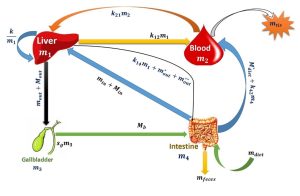
- Groundbreaking Mathematical Model Sheds Light on Bone Remodeling April 18, 2024
 In a significant academic achievement, the Department of Mathematics is proud to announce that Dr Koyel Chakravarty, an Assistant Professor, along with her diligent PhD Scholar, Ms Amrutha Sreekumar, has made a remarkable contribution to the field of biological mathematics. Their paper, titled “Exploring the Impact of PTH Therapy on Bone Remodeling: A Mathematical Investigation,” has been officially accepted for publication in the prestigious Journal of Biological Systems by World Scientific.
In a significant academic achievement, the Department of Mathematics is proud to announce that Dr Koyel Chakravarty, an Assistant Professor, along with her diligent PhD Scholar, Ms Amrutha Sreekumar, has made a remarkable contribution to the field of biological mathematics. Their paper, titled “Exploring the Impact of PTH Therapy on Bone Remodeling: A Mathematical Investigation,” has been officially accepted for publication in the prestigious Journal of Biological Systems by World Scientific.This paper presents a comprehensive mathematical model that investigates the effects of Parathyroid Hormone (PTH) therapy on bone remodelling processes. The research provides valuable insights that could potentially lead to more effective treatments for bone-related diseases and conditions.
The university community extends its heartfelt congratulations to Dr Chakravarty and Ms Sreekumar for their dedication and hard work.
Abstract
The regulatory role of parathyroid hormone (PTH) on bone, a crucial calcium reservoir, is influenced by sex steroids, notably estrogen. A mathematical model elucidates PTH-mediated bone remodeling mechanisms, examining plasma PTH effects and external dosages. Daily PTH injections, with their dual anabolic or catabolic action, offer a notable treatment for severe osteoporosis. This study predicts osteogenic responses to PTH, integrating factors like TGF-β, RANKL, and bisphosphonates in osteoblast-osteoclast signaling, alongside PTH’s effects on glands and regulatory molecules like Runx2, pCREB, and Bcl2. Using various methods, including simulations and sensitivity analysis, it aims to understand PTH therapy’s impact on bone volume, enhancing its clinical relevance.
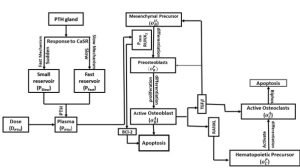
Explanation of the Research in Layperson’s Terms
The role of parathyroid hormone (PTH) in calcium storage within bones is significant, with its regulation influenced by other hormones, notably estrogen. A mathematical model has been developed to comprehend the effects of PTH on bones, examining both endogenous levels in the blood and exogenous intake requirements. It has been observed that daily PTH injections can be beneficial in treating severe bone conditions like osteoporosis, as these injections can induce either bone formation or resorption, depending on their administration method. Additionally, the response of bones to PTH is under scrutiny in this study, considering various substances such as TGF-β, RANKL, and bisphosphonates, and their interplay in maintaining bone health. Through the utilization of different methodologies including computer simulations, efforts are being made to precisely understand how PTH injections influence bone health, thereby enhancing their efficacy in addressing bone-related ailments.
Title of the Research paper in the Citation Format
Exploring the Impact of PTH Therapy on Bone Remodeling: A Mathematical Investigation
Practical Implementation or the Social Implications Associated
Personalized Treatment Plans:
Mathematical modeling of bone remodeling can facilitate the development of personalized treatment plans for individuals with bone disorders such as osteoporosis. By considering factors like hormone levels, genetic predispositions, and lifestyle factors, healthcare providers can tailor treatment strategies to optimize bone health outcomes.
1. Drug Development:
Insights gained from mathematical models can aid in the development of new drugs for bone disorders. By simulating the effects of potential therapeutic agents on bone remodeling processes, researchers can identify promising candidates for further investigation, potentially accelerating the drug discovery process.
2. Improved Clinical Decision Making:
Healthcare professionals can use mathematical models to make more informed clinical decisions regarding the management of bone disorders. By integrating patient-specific data into predictive models, clinicians can better predict treatment outcomes and adjust therapeutic interventions accordingly.
3. Enhanced Surgical Planning:
Mathematical modeling can also be valuable in surgical planning for procedures such as bone grafting or joint replacement. By simulating the effects of surgical interventions on bone remodeling, surgeons can optimize surgical techniques to promote more effective healing and long-term outcomes for patients.
4. Public Health Interventions:
Understanding the factors influencing bone remodeling at a population level can inform public health interventions aimed at reducing the burden of bone disorders. By identifying modifiable risk factors and developing targeted prevention strategies, policymakers can promote bone health and reduce the incidence of conditions like osteoporosis on a larger scale.
5. Educational Tools:
Mathematical models of bone remodeling can serve as educational tools for healthcare professionals, students, and patients. By visualizing complex biological processes in a simplified manner, these models can enhance understanding of bone physiology and the mechanisms underlying bone disorders, ultimately improving patient care and outcomes.Collaborators:
• Prof. D.C. Dalal, Professor, Department of Mathematics, IIT Guwahati
• Dr. L.N. Guin, Associate Professor, Department of Mathematics, Visva-BharatiFuture research plans.
a) Incorporating Multi-Scale Modeling: Future research could focus on integrating multi-scale modeling approaches to capture the intricate interactions occurring at different levels of bone structure, from the molecular to the tissue level. By incorporating information on cellular processes, tissue mechanics, and systemic factors, these models could provide a more comprehensive understanding of bone remodeling dynamics.
b) Accounting for Heterogeneity: There is a need to develop mathematical models that account for the heterogeneity observed in bone remodeling processes across individuals and within different anatomical sites. By considering factors such as age, sex, genetics, and bone quality, researchers can create more personalized and accurate models to predict individual responses to treatment and disease progression.
c) Integration of Advanced Imaging Techniques: Advances in imaging technologies such as micro-computed tomography (micro-CT) and magnetic resonance imaging (MRI) provide detailed insights into bone structure and function. Future research could focus on integrating data from these advanced imaging techniques into mathematical models to enhance their predictive capabilities and enable non-invasive monitoring of bone remodeling in clinical settings.
d) Exploring Therapeutic Interventions: Researchers could use mathematical modeling to explore the efficacy of novel therapeutic interventions for bone disorders, such as drug treatments, exercise regimens, and dietary interventions. By simulating the effects of these interventions on bone remodeling processes, researchers can identify optimal treatment strategies and accelerate the development of new therapies.Link to the article
DOI: https://doi.org/10.1142/S021833902450027X
Continue reading → - Celebrating Women’s Achievements in Pure and Applied Mathematics February 22, 2024
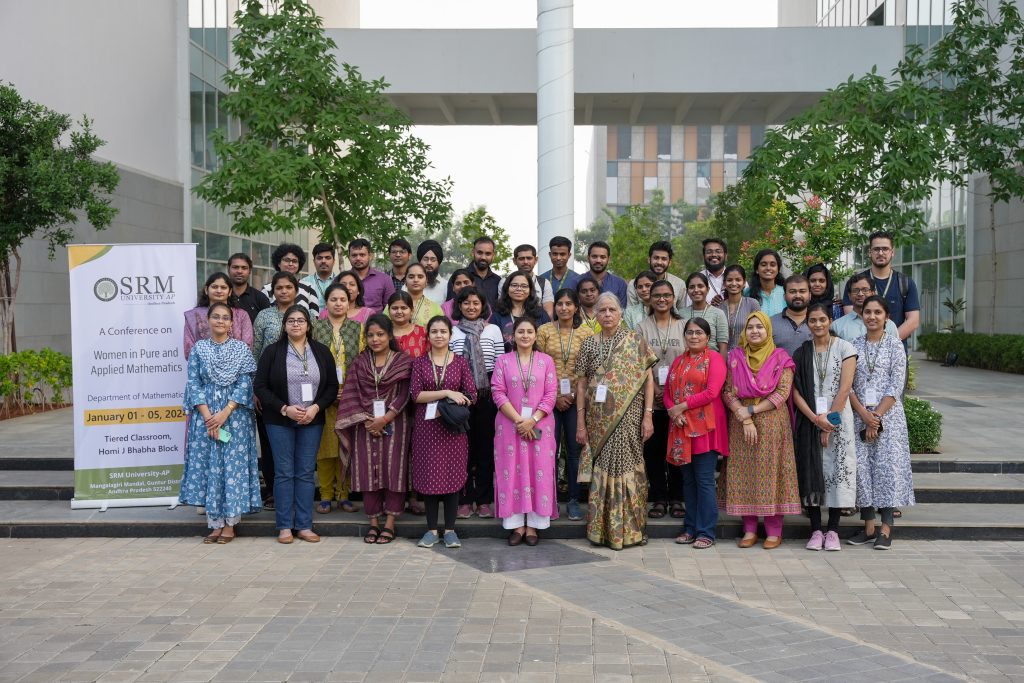
The Department of Mathematics had organised an International Conference on Women in Pure and Applied Mathematics (WPAM). The five-day-long conference featured luminaries in the field of Mathematics and was funded by three prominent Indian government research bodies: SERB, NBHM, and CSIR.
The event saw Prof. Raman Parimala, a renowned Indian Mathematician, acclaimed for her contributions to the field of Algebra. The Conference was held with the purpose of providing an empathetic platform for women mathematicians to present their cutting-edge research work and to share their concerns about the gender gap in mathematical science.
Prof. Sanoli Gun (President of Asian Oceanian Women in Mathematics), Prof. Vijaylaxmi Trivedi (Chairperson, Indian Women in Mathematics), and Prof. Anisa Chorwadwala (Member, Indian Women in Mathematics) motivated the students and provided the students with valuable inputs on how to pursue their career further in Mathematics. The luminaries also discussed activities conducted by their organisations to encourage established women researchers, women PhD scholars and advanced undergraduate-level women students in Mathematics.
During the conference, activities such as poster presentations were held to facilitate mathematical interaction between students. The conference ended with the hope that there will be more opportunities to organise similar events.
Continue reading → - Using Nonlinear Differential Equations to Formulate a Novel Approach to Combat HIV-1 December 11, 2023
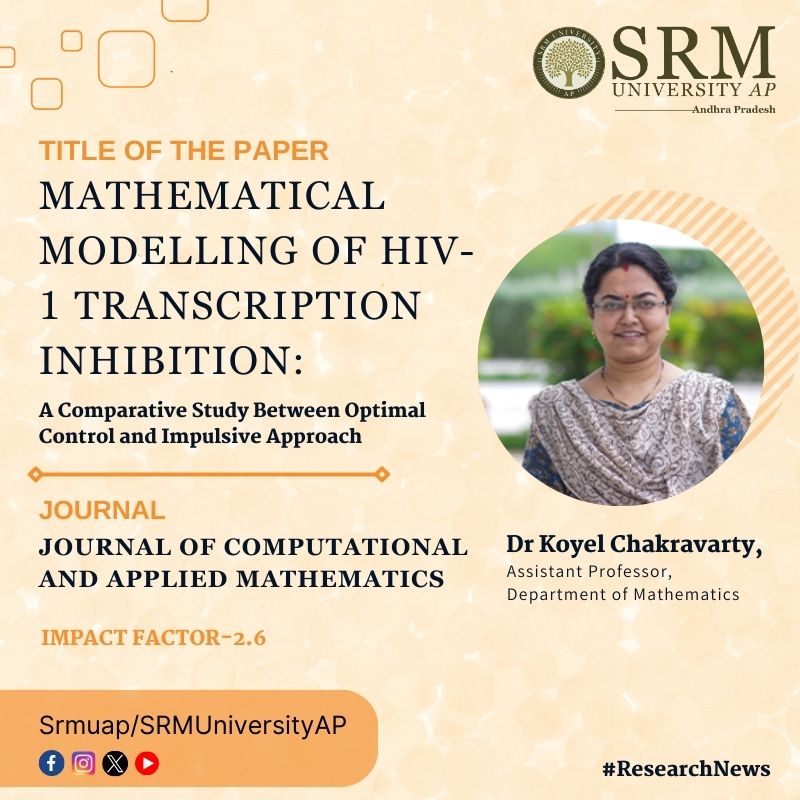
The combat against HIV, the virus responsible for AIDS has witnessed consistent advancements and studies put forward by researchers in various fields. To identify a more intelligent and effective approach to combat HIV-1 and enhance the understanding of the workings of its treatments, Dr Koyel Chakravarty, Assistant Professor, Department of Mathematics has published a paper titled “Mathematical modelling of HIV-1 transcription inhibition: a comparative study between optimal control and impulsive approach” in the Q2 journal, Journal of Computational and Applied Mathematics.
Abstract
By adopting a proactive strategy, this study facilitates the interaction with human immunodeficiency virus type I (HIV-1), successfully navigating its sequential fusion stages. This approach enables efficient infiltration of the virus into a target CD4+T helper cell within the host organism, initiating the virus’s replication cycle. As a retrovirus, HIV-1 orchestrates the conversion of its single-stranded viral RNA genome into a more stable double-stranded DNA structure. The newly formed DNA integrates with the host cell’s genetic material, and the pro-viral DNA transforms into functional messenger RNA (mRNA) with the assistance of the host enzyme RNA polymerase II (Pol II).
The ongoing research focuses on constructing a meticulous mathematical framework using a system of nonlinear differential equations. The investigation aims to assess the impact of a Tat inhibitor on suppressing the transcriptional activity of HIV-1, treating it as an optimal control problem. The study also evaluates the Tat inhibitor’s efficacy as a potential therapeutic intervention for HIV-1 infection. Employing a one-dimensional impulsive differential equation model to determine the mathematically derived maximum concentration of the elongating complex (P2), the research considers the crucial aspect of optimal timing between successive dosages. A comparative analysis contrasts the effects of continuous dosing with impulse dosing of the Tat inhibitor, using numerical analysis to evaluate outcomes. The findings underscore the superior effectiveness of impulsive dosing over continuous dosing in inhibiting HIV-1 transcription. Visual representations of the model’s parameter sensitivities enhance understanding of the intricate physiological and biochemical processes within the system.
Practical implementation/social implications of the research
1. Treatment Optimization:
• Practical Implementation: Develop personalized treatment plans for individuals with HIV-1 based on the optimal control and impulsive approaches identified in the study.
• Social Implication: Improve the effectiveness of HIV-1 treatments, potentially leading to better health outcomes and a higher quality of life for individuals living with the virus.
2. Drug Administration Guidelines:
• Practical Implementation: Provide guidelines for healthcare professionals on the timing and dosage of Tat inhibitors using insights from the comparative study.
• Social Implication: Enhance the efficiency of drug administration, potentially reducing side effects and improving patient adherence to treatment regimens.
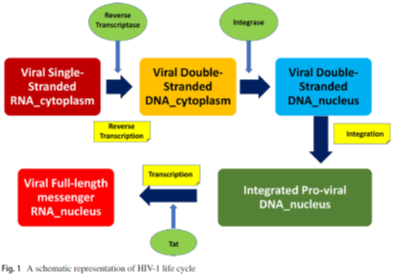
3. Public Health Planning:
• Practical Implementation: Incorporate the study’s findings into public health planning, considering the optimal and impulsive control strategies in broader HIV-1 prevention and treatment programs.
• Social Implication: Contribute to more effective and resource-efficient public health interventions, potentially reducing the overall burden of HIV-1 in communities.
4. Drug Development Strategies:
• Practical Implementation: Inform pharmaceutical companies and researchers about the comparative study results to guide the development of new HIV-1 inhibitors or improvements to existing drugs.
• Social Implication: Accelerate the development of more potent and targeted therapies, offering new options for managing HIV-1 infections.
5. Patient Education:
• Practical Implementation: Develop educational materials for individuals with HIV-1, explaining the importance of adherence to optimized treatment plans based on the study’s findings.
• Social Implication: Empower patients to actively participate in their treatment, potentially leading to better treatment outcomes and reduced transmission rates.
6. Policy Recommendations:
• Practical Implementation: Present policy recommendations to healthcare institutions and government agencies based on the study’s outcomes.
• Social Implication: Influence health policies to integrate the most effective strategies for HIV-1 transcription inhibition, potentially contributing to more efficient resource allocation and improved public health outcomes.
7. Global Health Impact:
• Practical Implementation: Collaborate with international health organizations to disseminate the study’s findings globally.
• Social Implication: Contribute to global efforts in controlling the HIV-1 pandemic, fostering collaboration and knowledge-sharing among nations.
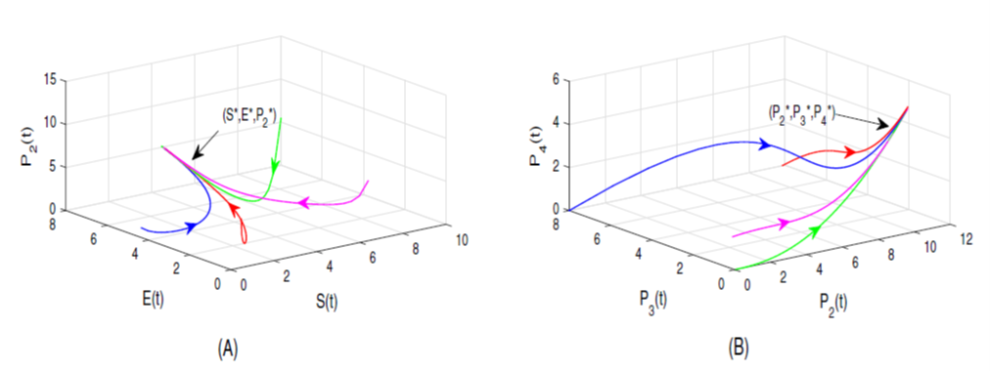
8. Reduced Healthcare Costs:
• Practical Implementation: If the impulsive approach proves more cost-effective, healthcare systems can implement this strategy to potentially reduce the overall cost of HIV-1 treatment
• Social Implication: Alleviate financial burdens on both individuals and healthcare systems, making HIV-1 treatment more accessible
In summary, the practical implementation and social implications of this study extend from optimizing individual treatment plans to influencing global health policies, ultimately contributing to more effective HIV-1 management and improved public health outcomes.
Collaborations
- Prof. D C Dalal, Professor, Department of Mathematics, IIT Guwahati
- Prof. A K Sarkar, Professor, Centre for Mathematical Biology and Ecology, Department of Mathematics, Jadavpur University
- Dr L N Guin, Associate Professor, Department of Mathematics, Visva-Bharati
Future Prospects of the Research
- Mathematical Modelling of Cholesterol Dynamics.
- Mathematical Modelling of Muscle Regeneration.
- Mathematical Modelling of Bone Remodelling
- Mathematical Modelling of Glucose-Insulin Dynamics.
- Mathematical Modelling on HIV-1 Transcription.
- Mathematical Modelling of Population Dynamics for Patients suffering from Diabetes.


